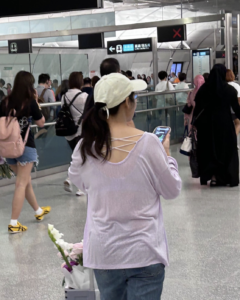Despite facing challenges, delivery workers brave heat, rain and customs inspectors to meet increasing demand for goods
By Wu Wanqing
HKU Journalism and Media Studies Centre
HONG KONG – Wearing light sweatpants and comfortable sneakers, Zhang Jinxiu, 36, was practically flying through an MTR station as she raced to meet her customer. She had a hand-pulled shopping cart full of food, medicine, and other daily necessities in one hand, and a stuffed backpack on her back. Although the air conditioner is cool enough for such hot weather, her hair was still soaked with sweat.
“Why did he buy so many drinks? There are so many bottles in there, and it’s heavy to carry them up,” said Zhang. “It’s not that easy even using the cart.”
Zhang is among a growing number of the cross-border errand runners who shuttle between Hong Kong and the Chinese city of Shenzhen just across the border to deliver goods. With the cheaper price and multiple food options in Shenzhen, plus the close proximity between it and Hong Kong and the ease of commuting, the cross-border errand industry is becoming a prevailing form of logistics business between these two cities.

Zhang Jinxiu, a cross-border delivery worker, is taking out her customer’s goods from her shopping cart.
On China’s Instagram-like app Xiaohongshu, a hashtag called “fan xiang dai gou (反向代购)” which literally means “reverse direction purchasing agent” has been set up to define the practice of hiring errand runners to buy things from Shenzhen, where prices are cheaper, and then delivering them to customers in Hong Kong. According to the statistics in Xiaohongshu, this hashtag has over 9.5 million views, with 8,000 people contributing to the discussion, and it has an increase of 7,084 interactions in the past month.
However, with the cross-border errand business on the rise, more problems are popping up. With no well-developed policies in both mainland China and Hong Kong to protect the gig workers’ labour rights, the errand runners are facing long working hours, low salaries and legal risks while transporting the goods.
“It’s mainly exhausting,” Zhang said. “The pay from the orders is particularly low for runners. So there are still big disadvantages to running errands.”
The Rise of Cross-Border Errand Business
The surge in cross-border errand runners or delivery workers can be attributed to the increasing demand for purchasing goods in Shenzhen.
In an effort to attract talent, the Hong Kong government has implemented new visa policies, which have enticed more people from mainland China to work and live in Hong Kong. These newcomers continually seek out food and other products they used to buy in Shenzhen. Additionally, the depreciation of the CNY and the lower prices in mainland China further stimulated the demand for goods, including among many longtime Hong Kong residents. In fact, many Hong Kong people travel across the border to buy groceries and other goods at hypermarkets in Shenzhen on their own.
However, despite this trend, there still remains a substantial demand for the service of errand runners from people who don’t want to spend the time or money to cross the border on their own to shop. Also, the transportation fee is usually much higher when crossing the border on foot.
The most common things runners deliver are takeaway food, fruits and vegetables, Zhang said. Other than that, there are also a lot of people who ask runners to help them deliver packages that cannot be transported directly to Hong Kong by courier.

The flowers purchased from Shenzhen City in mainland China and to be delivered by errand runner Zhang Jinxiu and her husband by the MTR subway system to customers in Hong Kong on Mother’s Day.
There are no specific figures on the number of people working as cross-border errand runners and it’s not clear how big the scale of this industry is, because most of the errand teams are not included in the sampling range of the government’s statistical surveys.
The Hong Kong Census and Statistics Department explained that sampling for the courier services sector relies on business registration records, but the errand teams, many of which are based in Shenzhen, do not register their business with the Hong Kong government. The government’s survey also excludes small transport activities, such as those carried out by individual transport labourers like the errand runners.
Why do workers choose to do errand jobs?
Some delivery workers began working in the errand business after being inspired by the experiences of others in the field, shared across various social media platforms.
“When I first came to Hong Kong, I wanted to find a part-time job. Then I looked into Xiaohongshu, noticing many people in Shenzhen are doing the errand business. I happened to make friends with a person who is also doing this,” Xu Zhiguo, a dishwasher in Hong Kong who does part-time errand job said. “Then he said, ‘why don’t you do some errands to earn some transportation fee or something?’ And I thought that’s a pretty good idea.”
Zhang also started because she saw the success of other people online, with considerable profits and lots of fans on social media.
“One reason is because after the COVID-19 lockdown, this kind of business can be resumed,” she said. “The other reason is that I saw a lot of people doing it in Xiaohongshu as well, and then I wanted to give it a try.”

Zhang Jinxiu is contacting her customers to pick up their goods at a Hong Kong MTR subway station.
These posts they mentioned usually imply the huge market of the errand business by describing their large number of orders, showing their sense of accomplishment after a busy day, letting the consumers trust them and appealing to other people to join their team as a runner.
A cross-border team organiser named Leon Cheng wrote in a post: “Taking up a sideline job is really satisfying…Although feeling tired and high-pressure, I feel full of achievements after a month. ”
According to the runners, they usually earn HK$20 to HK$30 per order if they’re shipping normal-sized items. If the goods are too big or too expensive, or if the destination is too far, the price will be higher. The wages of runners are determined based on the amount of orders. If there are many orders, some runners can earn up to HK$500 per day. But if there are fewer orders, the average hourly wage may not exceed the minimum wage in Hong Kong, which is HK$40 per hour.
The runners also agree that one of the reasons for them to choose this job is its flexibility. They can choose when to take orders and when not to take orders, and can control how many orders they take in total. This level of freedom is not typically found in conventional jobs.
“To be a runner is a freelance job,” Xu said. “Compared to working for a company, the freedom won’t be constrained.”
Zhang had to quit her previous job when she had her first child, because no one else in her family had time to take care of the baby. After her child turned five, she wanted to go out and work again, but she unexpectedly became pregnant with another child, which forced her to remain at home. After being a stay-at-home mom for so long, she didn’t think she could find a job again, but the errand running job gives her an opportunity to work when her husband is at home taking care of their children, allowing her to make extra money for the family.
Xu’s situation is similar. He came to Hong Kong to work as a dishwasher to save some money, and he also does errand work as a part-time job. He lives in a dormitory near his workplace. He scrubs the dishes at the time he’s supposed to be working, and when he’s done, he just goes back to his dorm and doesn’t go anywhere else. So for him, the nicest thing about this delivery job is that he can have the freedom and flexibility to accept or decline jobs.
Struggles: Low Salaries, Legal Issues, and Unregulated Industry
However, many errand runners face problems.
The first is low salaries compared to the amount of time and effort invested by the runners.
According to Zhang, the organisers who only handle online orders claim a significant portion of the earnings, leaving only a small percentage for the runners themselves. The team organisers typically only compensate the runners for the specific order process, neglecting to account for working times and the duration and distance required to complete the delivery, she and others said.
“The money we earn from running errands is quite little,” Zhang said. “In fact, it’s not quite profitable to run errands for others. It’s better to have your own business.”
Liao Wanglong, a former runner who is doing other jobs now, said he once delivered about 20 orders, and earned around 300 yuan , with no subsidy for the transportation fee he spent, which costs over HK$50.
“We basically ran to almost the entire Hong Kong. I left home around 10 a.m. that day and didn’t get home until after 10 p.m.,” Liao said. “It’s indeed hard work.”
In addition to low salaries, the fees paid by customers are also low when compared to local delivery fees in Hong Kong. This is because marketing on social media was the only way to expand the client, so delivery fees are transparent to everyone, giving people an option to choose the cheapest one.
The transparency of prices encourages organisers to lower their product prices in order to increase sales and achieve greater profits through the strategy of selling at a low profit margin but in high volume. And it makes the errand price much cheaper.
The unregulated industry also presents legal problems for errand runners. Runners are subject to customs inspections when crossing the border with the goods. Many times among the items they transport will be medications, some of which are prohibited by customs. And, if they are carrying more than HK$5,000, they will have to pay extra taxes.
Zhang once had to pay extra money and didn’t earn any money after a long day of errand work. She paid HK$780 in customs duty because she didn’t realise that the shoes she helped bring across the border cost more than the duty-free rate.
And, to avoid being taxed, she gave a 2,000 yuan pair of shoes to a stranger next to her to return to her after she crossed the border. However, the woman disappeared after crossing the border. She could not call the police to recover the loss and had to compensate the customer out of her own pocket.
“What bad luck,” said Zhang. “My husband told me, ‘Just consider it payment for a lesson.’”
Lack of regulations on gig workers’ labour rights
According to labour rights group the federation of Hong Kong and Kowloon labour unions, the absence of necessary regulations in the industry results in various issues such as low wages, legal violations, and disproportionate compensation for labour.
Mainland China has implemented guidelines in 2021 on safeguarding the labour rights and interests of workers, but there are no legal protection and specific implementation rules yet.
In Hong Kong, there is also no specific legislation to protect the rights of gig workers. According to the Hong Kong labour department, apart from the average hourly salary, gig workers in Hong Kong do not have other labour rights such as labour training or occupational safety and health which formally employed workers have.
In a statement issued by the Federation of Hong Kong and Kowloon Labour Unions in response to the Hong Kong Chief Executive’s 2023 policy address, it suggested that legislation and policies should be enacted to protect the gig workers’ rights, including limiting how many hours they are expected to work.
Despite the grey areas, the increasing number of online orders and the potential for high earnings still attracts the runners to stay in this industry.
After waiting at the subway station for a long time to meet her last customer, Zhang ended up getting on the subway home with a bag of snacks, which were ordered for a customer. But after arriving at the delivery destination, she couldn’t get in touch with her customer for the whole afternoon.
In most cases, customers pay money in advance for Zhang to help them purchase the goods. But for this order, the customer wanted Zhang to purchase the snacks first and then she would pay her upon delivery.
“If I can’t get in touch with this customer, in the end, I’ll just have to take the stuff home and eat it myself,” said Zhang. “It’s really a bummer.”
As a storm suddenly broke, she stayed in the subway station for an hour, waiting for the rain to stop. When she finally arrived home, it was already 9 p.m. She didn’t get to have dinner with her family, but she shared the snacks with her children, cherishing the simple moments she could share with them, after a long day of delivering.
“It would be nice to keep doing this if I could,” she said. “It’s a way to make money anyway. ”
Advisor: Cindy Sui

